i Transitional Justice in
Troubled Societies
ii Studies in Social and Global Justice
Series Editors:
Ben Holland, Lecturer in International Relations, The University of Nottingham
Tony Burns, Associate Professor, The University of Nottingham
As transnational interactions become more prevalent and complex in our interconnected world, so do the questions of social justice that have often featured in political discourse. From new debates in human rights and global ethics to changing patterns of resistance and precarity in the global economy, via an interrogation of the impact of climate change, Studies in Social and Global Justice publishes books that grapple with a broad array of critical issues faced in the world today.

Labour and Transnational Action in Times of Crisis , edited by Andreas Bieler, Roland Erne, Darragh Golden, Idar Helle, Knut Kjeldstadli, Tiago Matos and Sabina Stan
A Human Right to Culture and Identity: The Ambivalence of Group Rights , by Janne Mende
Exploitation: From Practice to Theory , edited by Monique Deveaux and Vida Panitch
Regulation Theory and Australian Capitalism , by Brett Heino
Transitional Justice in Troubled Societies , edited by Aleksandar Fati, Klaus Bachmann and Igor Lyubashenko
iii Transitional Justice in
Troubled Societies
Edited by
Aleksandar Fati, Klaus Bachmann
and Igor Lyubashenko

iv Published by Rowman & Littlefield International Ltd.
6 Tinworth Street, London SE11 5AL
www.rowmaninternational.com
Rowman & Littlefield International Ltd. is an affiliate of Rowman & Littlefield
4501 Forbes Boulevard, Suite 200, Lanham, Maryland 20706, USA
With additional offices in Boulder, New York, Toronto (Canada), and Plymouth (UK)
www.rowman.com
Selection and editorial matter Aleksandar Fati, Klaus Bachmann and Igor Lyubashenko, 2018
Copyright in individual chapters is held by the respective chapter authors.
All rights reserved . No part of this book may be reproduced in any form or by any electronic or mechanical means, including information storage and retrieval systems, without written permission from the publisher, except by a reviewer who may quote passages in a review.
British Library Cataloguing in Publication Data
A catalogue record for this book is available from the British Library
ISBN: HB 978-1-78660-588-7
Library of Congress Cataloging-in-Publication Data Available
ISBN: 978-1-78660-588-7 (cloth: alk. paper)
ISBN: 978-1-78660-590-0 (electronic)
 The paper used in this publication meets the minimum requirements of American National Standard for Information SciencesPermanence of Paper for Printed Library Materials, ANSI/NISO Z39.48-1992.
The paper used in this publication meets the minimum requirements of American National Standard for Information SciencesPermanence of Paper for Printed Library Materials, ANSI/NISO Z39.48-1992.
Printed in the United States of America
v Contents
vi
Introduction
Transitional Justice as Conflict-Resolution
Aleksandar Fati
The title of this book is Transitional Justice in Troubled Societies . One might wonder whether the title is an oxymoron, given that transitional justice is often understood as pertaining, by definition, to difficult and challenging societies. Our view here is different. Transitional justice exists even in the most stable and traditional societies, which do not appear to be undergoing any kind of political, social or value transition. Rather than being some sort of partial, extraordinary, intervening form of justice in irregular social circumstances, as it is sometimes made out to be, transitional justice is a form of justice per se. It is a type of justice which relates the abstract goals of justice (the achievement of proportionality between crime and punishment, the satisfaction of moral intuitions, or expressing a societys attitude to certain values and types of behaviour, for example) to other social ends. Thus it is a sobering type of justice, which tells us something about justice in general, primarily that justice always serves other social goals. On an institutional level, it is always instrumental to something else, and thus also, necessarily, prejudiced by broader social and political considerations. In other words, transitional justice indicates the political nature of justice in general.
This view, which the editors of this volume have espoused in several places so far, may seem unpalatable at first, especially to those who have become accustomed to thinking about justice as a set of values or standards that rule society and thus, in a sense, emanate down to institutions and the political system. This essentialist view of justice is traditional and is built into our thinking that political orders may be more or less just, that dictators ought to be ousted if they rule unjustly, or that penal policies are subject to the requirements of the moral law as their ultimate foundation and testing ground. Indeed, all of these considerations apply to institutional justice, but only because such justice is a political construct, and not because it is an emanation of abstract, pure justice, which is supposed to rule them. This means that political considerations are not as immoral as we are used to thinking of them: they arise from deeply held moral reasons and a difficult, often unpredictable, balancing of various utilitarian, deontic, virtue- and other types of ethics which various stake holders adopt. Political judgements are based on human thought, and human thought is morally laden just as it is subject to emotional and interest-driven views. Justice is thus a construct of the political process, and the way in which this process is governed depends on a complex interplay of the various values which cause social leaders, including the policy makers, to make their decisions.
We have chosen to provide a forum in this book for the discussion of transitional justice in troubled societies not because such justice is specific to such societies, but because troubled societies make the general features of transitional justice more obvious and easier to convey. The same principles of transitional justice apply to war crimes trials at the Hague and to land ownership issues in Zimbabwe, just as they do to the transformations of criminal law in European countries, where, in many jurisdictions, money laundering is now treated as a more serious crime than the very crimes by which the criminal profits were generated in the first place. All of the decisions and changes in institutional justice are dictated by broader social policy. However this does not usually agree with the dominant rhetoric of the institutions of justice and their leaders. Only too often we hear that justice should be blind to who is before it. Justice is never blind; in fact, we would contend that a blind justice is the worst possible form of justice: justice always considers ones position in society, their relative value to the others and the relationship between the persons actions and the prevailing social values. The personhood, or the subjectivity of those who are judged, is as important as the deeds which are being judged. This is the nature of justice in general, and the instrumental dimension of it is the most obvious in transitional justice.
While all the chapters in this book address the various aspects of transitional justice in a postconflict transitional context, they assume, to various extents, that in addition to, or even as opposed to, implementing transitional criminal justice, transitional justice serves the crucial goal of conflict resolution. This extended introduction therefore discusses this underlying thread of the book in some detail.

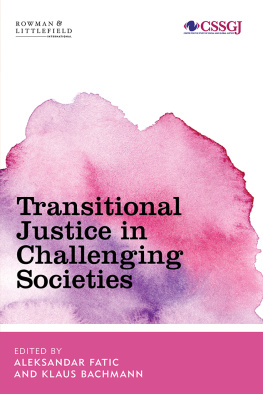

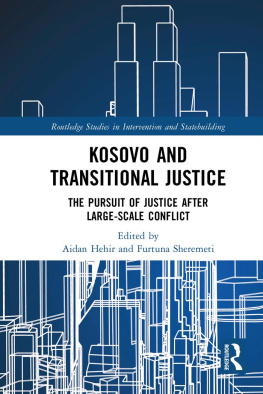
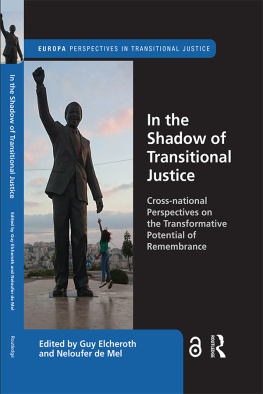
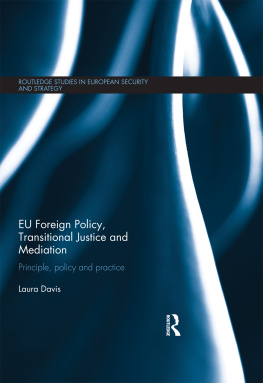
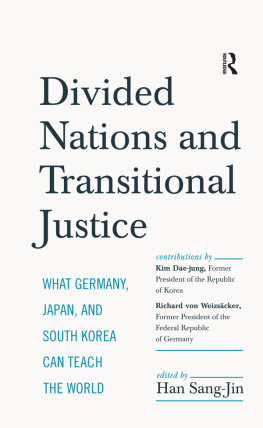
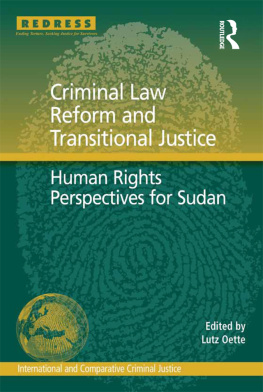
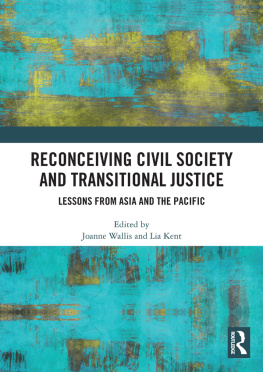
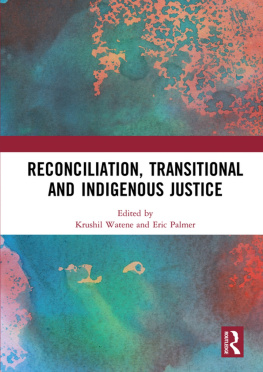
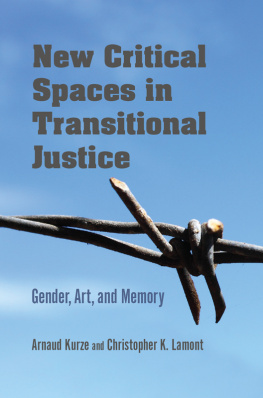
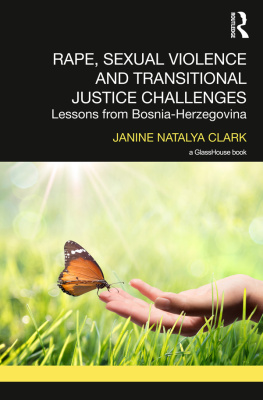
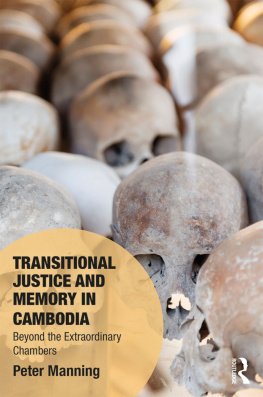



 The paper used in this publication meets the minimum requirements of American National Standard for Information SciencesPermanence of Paper for Printed Library Materials, ANSI/NISO Z39.48-1992.
The paper used in this publication meets the minimum requirements of American National Standard for Information SciencesPermanence of Paper for Printed Library Materials, ANSI/NISO Z39.48-1992.